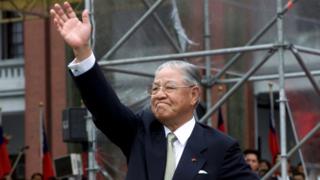 Image copyright
Image copyright
Reuters
Lee won Taiwan’s first presidential vote by a landslide
Former Taiwanese President Lee Teng-hui, considered the “father of Taiwan’s democracy”, has died at the age of 97.
He served as president of the Republic of China, Taiwan, from 1988 to 2000.
Lee was credited with ending autocratic rule in favour of pluralism and democracy – but was also a controversial figure.
His attempts to delink the island from China sparked tensions with Beijing, which sees Taiwan as a wayward province to be reunited one day.
Lee died on Thursday from septic shock and multiple organ failure in Taipei, after being in hospital for nearly six months.
During his time in office he led constitutional changes towards a more democratic political layout, including direct presidential elections.
Current President Tsai Ing-wen said “he laid the foundation of a democracy built on pride and our own identity”.
Lee thrived on defying China’s drive to absorb the island and hoped for Taiwan to be “a country of democracy, freedom, human rights and dignity.”
He became president in 1988 after the death of predecessor, Chiang Ching-kuo.
In 1996 – the first direct presidential election in Taiwan – he was democratically elected for a second term with a landslide victory.
Ahead of the vote, mainland China conducted months of intimidating war games and missiles tests around the water to influence the election against him.
Since a civil war in the 1940s, China sees Taiwan as a breakaway province that will eventually be part of the country again. But many Taiwanese want a separate nation.
Taiwan’s current President Tsai Ing-wen is considered Lee’s protege and appears to follow in his footsteps – distancing Taiwan from the mainland while garnering US backing, with tensions reaching a new high in recent years.
‘Lee made democracy a reality’
Analysis by Cindy Sui, BBC News, Taiwan
While his predecessor Chiang Ching-kuo paved the way for democracy, Lee Teng-hui made it a reality.
While he was president, he got rid of laws that hindered democratic development, overhauled the legislature, carried out free legislative elections, and allowed Taiwanese people to vote for their president for the first time.
This has had a lasting impact on Taiwan, helping it become a vibrant democracy, which was not possible in Japanese colonial times – or in the early decades of nationalist rule.
But he has also been criticised for unnecessarily antagonising China, and raising tensions between Taiwan and the mainland.
Lee’s attempts to get rid of Taiwan’s historical links with mainland China – and regard itself as a separate country – prompted Beijing to test fire missiles near Taiwan, which led to Washington sending the biggest armada of warships to Asia since the Vietnam War, in the potentially explosive 1995-96 Taiwan Strait Crisis.
Both Beijing and Taipei have since built up their military, turning the region into one of the biggest flashpoints in the world.
But his legacy of bringing about democracy in Taiwan, much quicker than it might have come, continues beyond his death.
After his presidency, Lee was indicted on charges of embezzling public funds, but was acquitted.
And later in life, he was criticised for his pro-Japanese colonial views, which were considered outdated.
He visited Japan’s Yasukuni Shrine, which honours World War Two war criminals, and rejected as lies Japan’s wartime atrocities – the Nanjing Massacre and use of so-called comfort women as sex slaves.
He also upset many Taiwanese by saying the Taiwan-claimed Diaoyutai Islands belonged to Japan.
Image copyright
EPA
Current President Tsai (left) was a protege of Lee (right)